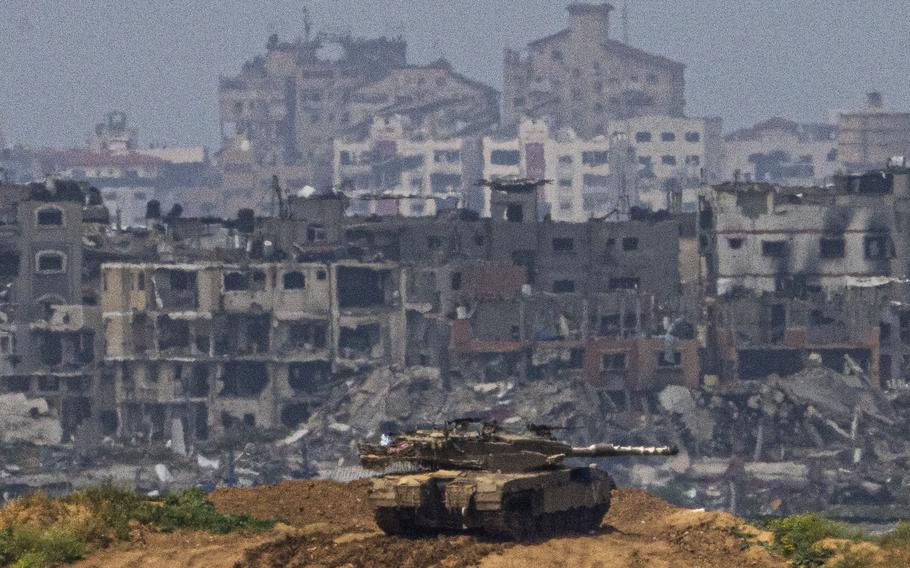Middle East
Cease-fire still elusive, but observers say Hamas position may be easing
The Washington Post March 20, 2024

An Israeli tank positioned on the border with Gaza Strip in southern Israel on March 19, 2024. (AP)
DOHA, Qatar — Starkly different visions of how to end the war in Gaza remain at the center of slow-moving negotiations between Israel and Hamas in Doha this week as officials briefed on the discussions say a deal still could be weeks away - or upended entirely by an Israeli assault on Rafah.
For months, Hamas has demanded a permanent cease-fire in Gaza in exchange for the release of Israeli hostages, while Israeli Prime Minister Benjamin Netanyahu has pledged to continue the war against Hamas until the group is eliminated.
But in recent weeks, Hamas appears to have softened its stance, suggesting that the group is open to an initial pause in fighting that is not locked to a permanent cease-fire, according to a Western diplomat with knowledge of the negotiations who, like others, spoke on the condition of anonymity to discuss the highly sensitive talks.
“Hamas seems more willing to accept something less than previous weeks,” he said.
Hamas and Israel have traded hostage-release proposals for weeks. But despite mounting international pressure and high-level meetings including one in Paris attended by intelligence chiefs from the United States, Israel and Egypt, the two sides have remained deadlocked.
As talks failed to make progress earlier this year, mediators introduced a proposal for a phased agreement that would initially pause fighting and include a path to a comprehensive cease-fire.
“This is not a negotiation that will end in days — it will end, maybe, in weeks,” said an Israeli official briefed on the discussions.
In a briefing Tuesday, Majed al-Ansari, a spokesperson for the Qatari Foreign Ministry, stressed that the process would be laborious, as negotiators in Doha shuttle messages between the two sides, who do not meet face-to-face. Officials say that it can take as long as 36 hours to get a message to Hamas leader Yehiya Sinwar, who is overseeing negotiations from his hiding place, believed to be deep in the tunnels under Gaza.
The talks on the first phase of the deal are centered on the release of 35 Israeli civilian hostages in return for a six-month pause and 350 Palestinian prisoners, according to a Western diplomat with knowledge of the negotiations. The Israeli official said that Israel wants the first batch of hostages released to include five female soldiers, who Hamas consider to be of higher value.
Even if Hamas offers significant concessions, some observers question whether there is the political will in Israel for a deal, as its team works on formulating a counter offer to present to Hamas.
“There is reason for a little bit of optimism because the Hamas answers indicated some flexibility,” said Gershon Baskin, who helped negotiate the release of captured Israeli soldier Gilad Shalit in 2011. “But it’s not clear to me whether or not Netanyahu wants an agreement, and that is evident by the fact that the negotiations are not being conducted by the highest level of negotiators.”
Israel is under pressure from its closest ally, the United States, to make progress in talks and forgo a Rafah incursion that could result in a humanitarian catastrophe. Blinken will be making a previously unannounced trip to Israel on Friday after stops in Saudi Arabia and Egypt this week.
“Blinken will discuss with the leadership of the Government of Israel the ongoing negotiations to secure the release of all hostages,” State Department spokesman Matthew Miller said in a statement.
With the top lieutenants of Netanyahu in Washington next week, Blinken’s visit will enable him to have a face-to-face encounter with Netanyahu himself as U.S. officials seek concrete plans from the Israelis to protect civilians in any incursion into Rafah, and presenting their own vision of what should be done.
The talks in Doha come at a critical time for Gaza, where a famine may already be unfolding and more than 30,000 people have been killed, according to health authorities. Israel is also readying its attack plans for Rafah, the last refuge for more than 1 million displaced Palestinians.
Today, a majority of Israelis prioritize eradicating Hamas over the return of the hostages, and Netanyahu has emphasized that his priority is “total victory.”
Netanyahu seems more focused on asserting military pressure and killing Hamas military leaders such as Sinwar and Mohammed Deif, Baskin said.
“There is an assumption that if we kill Deif and Sinwar, the chain of command will break down,” he said. “Why assume that the hostages will not be executed?”
In the negotiations, Israel’s red lines are threefold, said Yaakov Amidror, a former Israeli national security adviser. “We cannot stop the war, we cannot retreat from Gaza, we will not allow all the civilians to go back to the north.”
The Israeli official outlined other stumbling blocks, such as the fact that Hamas has not met Israel’s demand for a list of hostages that remain alive, while the “profiles of the prisoners” is also in contention.
“I haven’t heard optimism in the room,” the official said. “What I’ve heard is that there is work to be done.”
Objections to civilians returning to the north may be a negotiating tactic, Baskin said. “Negotiations take place on the table, but they also take place through misinformation,” he said.
Morris reported from Berlin, Birnbaum from Jeddah, Saudi Arabia.